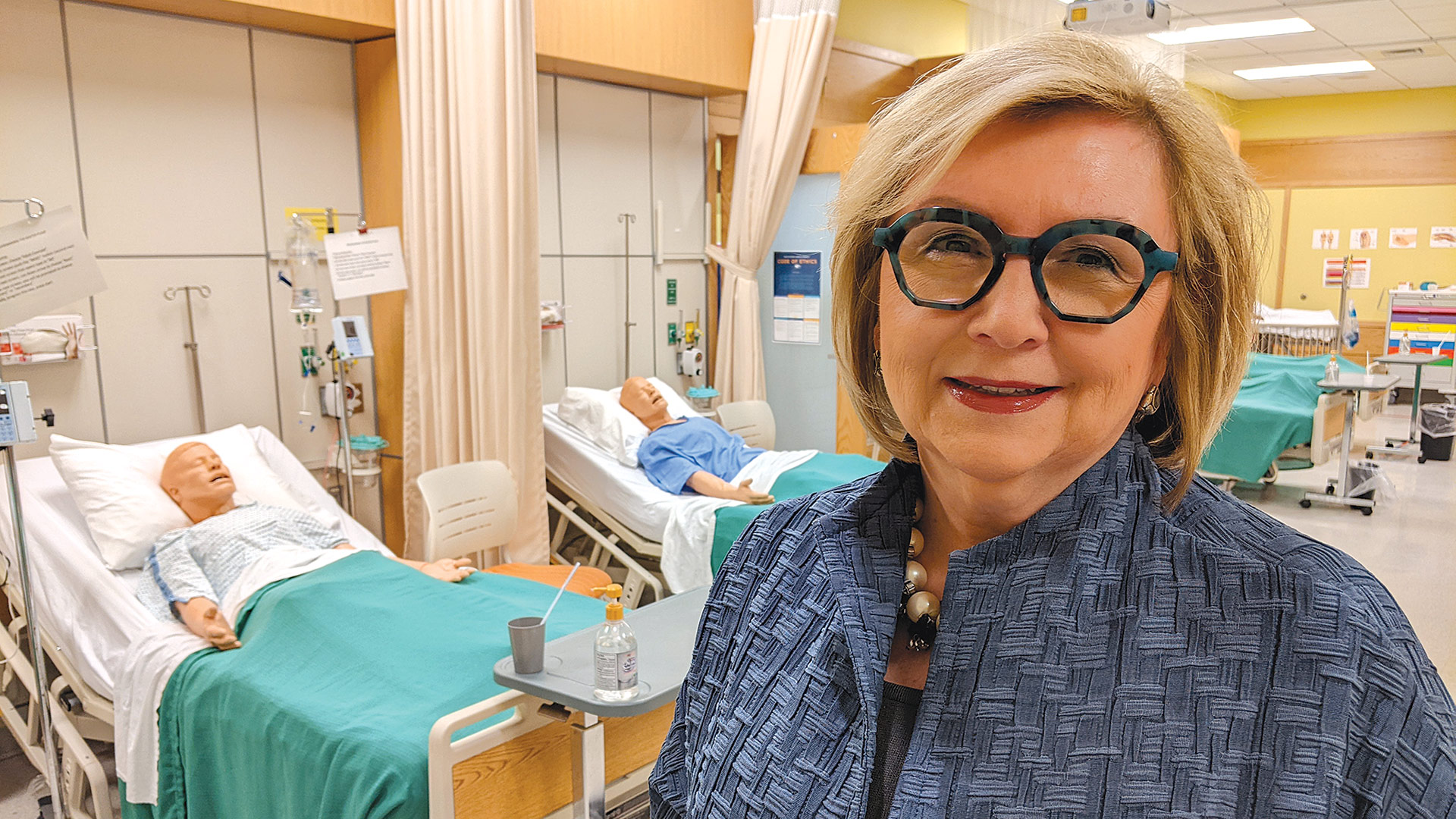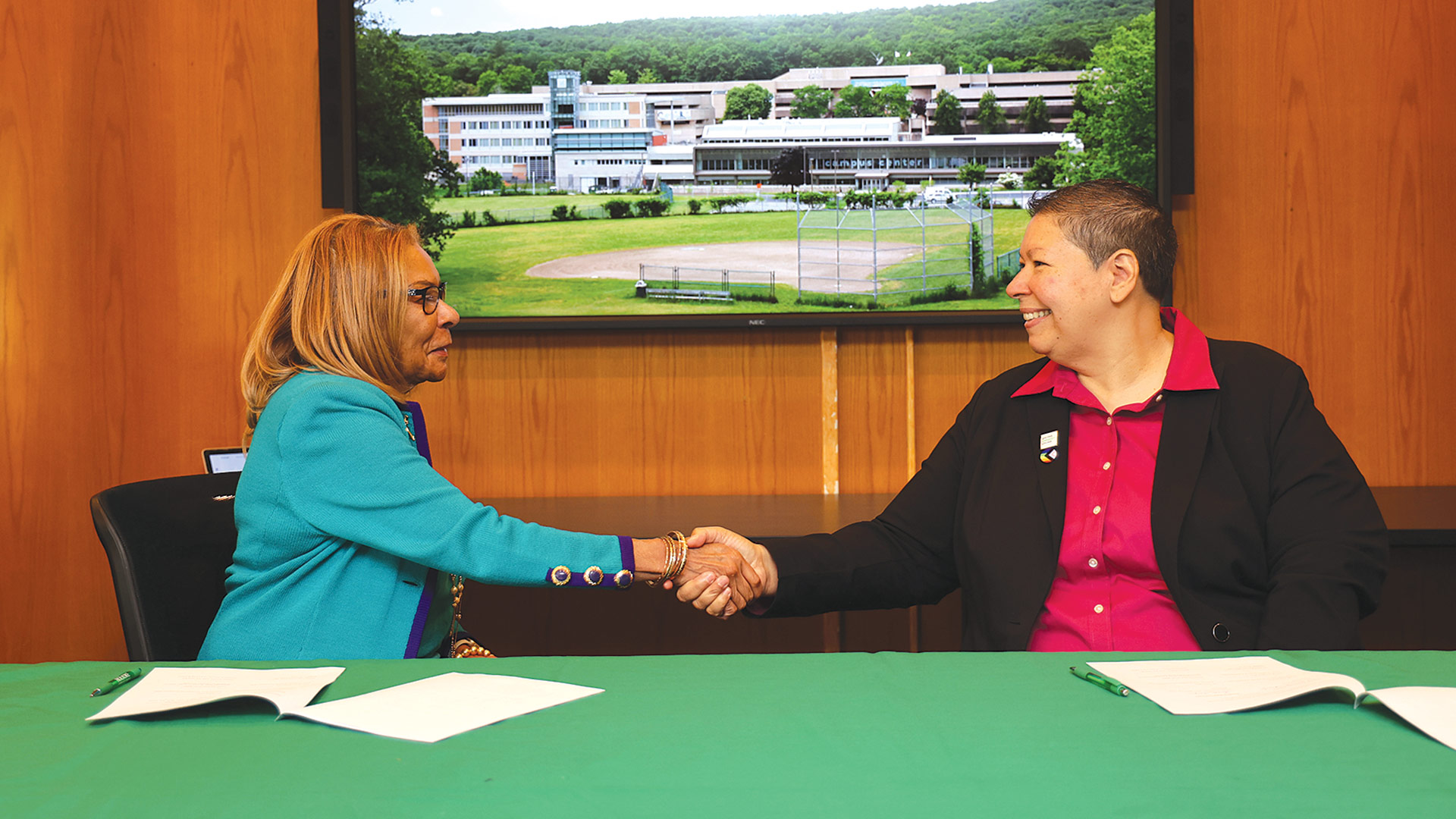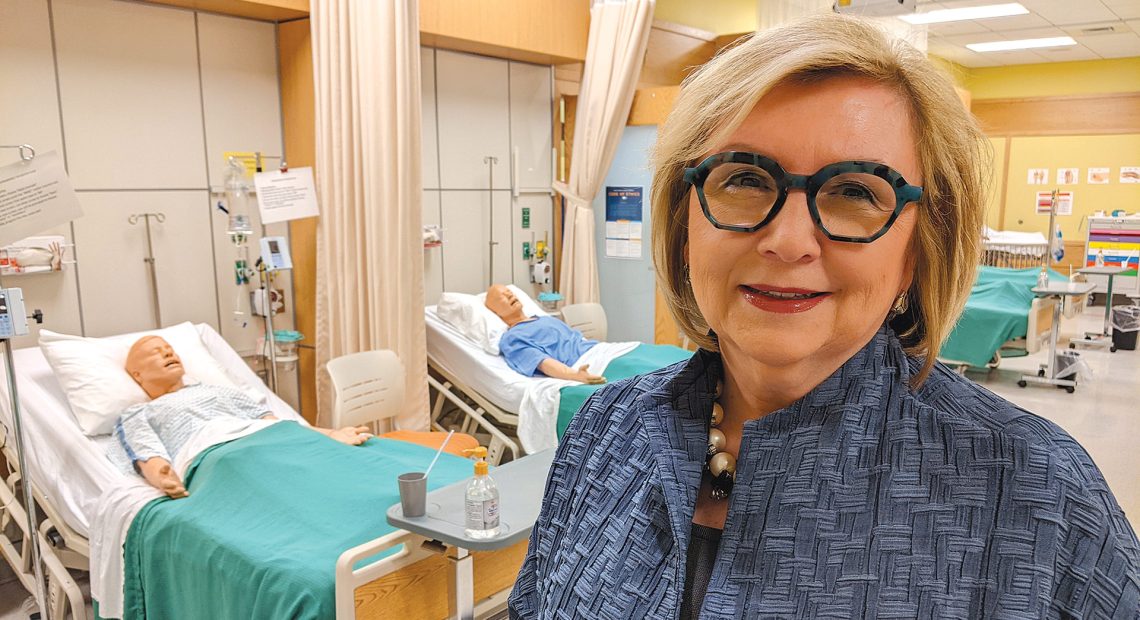Easing the Strain

Teresa Kuta Reske, in the nursing simulation lab at Elms College, said many nurses were influenced in their career choice by care they or a loved one received.
Teresa Kuta Reske loves nursing.
She said that on more than one occasion when speaking with BusinessWest recently for this special HCN section celebrating nurses, and especially recent nursing graduates beginning to enter the workforce.
As interim dean of the Elms College School of Nursing and director of the college’s Doctor of Nursing Practice program, she also loves seeing that passion develop in students.
“We prepare nurses with the skills and knowledge it requires to be in the nursing workforce, but when partnered up in the hospital setting, with students having clinical experience and being mentored by these organizations, they’re learning about what nurses contribute to patient care, watching nurses in action, and seeing systems come together,” Reske said, adding that there’s only so much students can learn in a simulation lab; they learn to form their own professional identity when training inside the healthcare system.
She noted that many students gravitate to the profession because of positive experiences with nurses, either for themselves or a loved one. In other cases they were influenced by a parent’s career in the field. But that passion also quickly gets tempered by the realities of an increasingly challenging job.
“When we build a strong nursing workforce, it begins with education. And educators are tasked with teaching the new demands of the healthcare system,” Reske said, with factors ranging from population-health concerns to a more interdisciplinary focus in patient care. “Learning to become a nurse means understanding the realities of the nursing workforce today.”
Those realities come at a time when staffing shortages have increased stress on nurses. At a time when the annual Gallup Honesty and Ethics poll, released in January, ranks nursing as the most trusted profession for the 21st year in a row, nurses are feeling strain.
In fact, the American Hospital Assoc. (AHA) reports that about 100,000 registered nurses left the workforce during the past two years due to stress, burnout, and retirements, and another 610,388 intend to leave by 2027, according to a recent study by the National Council of State Boards of Nursing (NCSBN).
“The pandemic has stressed nurses to leave the workforce and has expedited an intent to leave in the near future, which will become a greater crisis and threaten patient populations if solutions are not enacted immediately,” said Maryann Alexander, NCSBN’s chief officer of Nursing Regulation. “There is an urgent opportunity today for healthcare systems, policymakers, regulators, and academic leaders to coalesce and enact solutions that will spur positive systemic evolution to address these challenges and maximize patient protection in care into the future.”
Among other recommendations to strengthen the healthcare workforce, AHA has urged federal lawmakers to invest in nursing schools, nurse faculty salaries, and hospital training time; enact federal protections for healthcare workers against violence and intimidation; support apprenticeship programs for nursing assistants; increase funding for the National Health Service Corps and the National Nurse Corps; and support expedition of visas for foreign-trained nurses.
For its part, Baystate Health said the Gallup poll is worth celebrating.
“The honor comes as nurses throughout the country, including here at Baystate Health, continue to deal with the effects of a nationwide nursing shortage and the emotional impact that the COVID pandemic has had on nurses,” said Joanne Miller, chief Nursing executive for Baystate Health and chief Nursing officer at Baystate Medical Center. “I am proud to say that, since the beginning of the pandemic, every nurse at Baystate Health has fulfilled our promise of advancing care and enhancing lives.”
Today’s nearly 4.4 million registered nurses in the U.S. constitute the nation’s largest healthcare profession, and the field offers a wide range of opportunities to those considering a career, including practicing as clinicians, administrators, researchers, educators, and policymakers.
In 2022, Baystate Health welcomed more than 900 nursing students into clinical placements from nursing programs at American International College, Bay Path University, Elms College, Holyoke Community College, Greenfield Community College, Springfield Technical Community College, UMass Amherst, and Westfield State University.

Westfield State University President Linda Thompson, left, and Holyoke Community College President Christina Royal shake hands after signing a dual-enrollment nursing program agreement.
Newly graduated registered nurses (with less than 12 months of clinical nursing experience) can apply to its 10-month paid nurse residency program. During that time, they work directly with a unit preceptor and nurse educator for clinical instruction combined with classroom-style seminars and skills/simulation sessions. The collaborative learning approach is designed to provide the knowledge base and skillset needed to successfully transition into the role of a professional nurse.
Reske said professional experiences like these demonstrate the need for collaborative practice. “They’re not alone but working with other teams, providing patient care where everyone is thinking about how to improve the patient’s health and experience, looking at that patient’s values and experiences.
“We’re preparing students to understand the complex realities of healthcare today,” she went on. “Nurses can really make a unique difference by looking at patients through the nursing lens with a more holistic view.”
Satisfaction Suffers
While all this is meaningful work, many nurses feel there’s a long way to go to reach ideal job satisfaction. According to the annual “State of Nursing in Massachusetts” survey conducted by the Massachusetts Nurses Assoc. (MNA), bedside nurses feel undermined in their ability to provide quality care by understaffing and assigning unsafe numbers of patients, which fuels the flight of nurses away from the profession and leads to hospitals relying on expensive travel nurses to fill the void. Among the survey data:
• 85% of nurses say hospital care quality has deteriorated over the past two years;
• 53% say hospitals that rely on travel nurses have worse care;
• 71% of nurses say their biggest obstacle to delivering quality care is understaffing and/or having too many patients at one time; and
• 88% of nurses support legislation limiting the number of patients assigned to a nurse at one time.
That last statistic rises to 98% when only new nurses are surveyed, demonstrating that nurses are entering the field with eyes wide open to to the impact of staffing challenges.
Rather than causing the staffing crisis, said Katie Murphy, a practicing ICU nurse and president of the MNA, “the COVID-19 pandemic has simply laid bare a system already broken by hospital executives. The industry claims it cannot find nurses, but the data shows there are more nurses than ever. There is not a shortage of nurses, but rather a shortage of nurses willing to work in these unsafe conditions.”
“Nurses throughout the country, including here at Baystate Health, continue to deal with the effects of a nationwide nursing shortage and the emotional impact that the COVID pandemic has had on nurses.”
This year’s survey featured an all-time high number of nurses saying hospital care quality has gotten worse over the past two years. The survey has tracked this number since 2014, when it was 38%. In 2023, 85% of nurses saw care quality decline, up two points from last year, 30 points from 2021, and 46 points from 2019. This troubling trend tracks with survey results showing increased numbers of nurses who do not have enough time to give their patients the care and attention they need and who are forced to care for too many patients at one time. In 2023, 72% of nurses saw both of those issues as “major challenges,” up 11 and 13 points from 2021.
Newer nurses are disproportionately feeling the impact. Sixty-three percent of nurses with five or fewer years of experience say understaffing is their biggest obstacle to providing quality care, compared to 56% of all nurses. Of those nurses planning to leave the field within two years, 67% of newer nurses say they will find work outside of healthcare, compared to 31% of all nurses.
Colleges are doing what they can to draw new nurses into the pipeline. For example, Holyoke Community College (HCC) and Westfield State University (WSU) recently announced a new pathway for individuals to earn both an associate degree and bachelor’s degree in nursing simultaneously or in a streamlined manner by combining the curricula of both programs. The concurrent program is the first in the Commonwealth.
“The concurrent ADN-to-BSN pathway is an innovative approach to nursing education,” WSU Executive Director of Nursing Jessica Holden said. “It enables students to earn their ADN while simultaneously completing coursework that counts toward their BSN. This integration of education allows for a more efficient and streamlined approach to nursing education that is advantageous to some students.”
The concurrent nursing program will help address the nursing shortage by increasing the number of students who can get into a bachelor of nursing program and allow them to earn their degree faster.
According to a Massachusetts Health Policy Commission report, “registered-nurse vacancy rates in acute-care hospitals doubled from 6.4% in 2019 to 13.6% in 2022, with especially high vacancy rates in community hospitals. Employment in nursing and residential care facilities has not recovered since 2020 and remained below 2018 levels.”
HCC Director of Nursing Teresa Beaudry explained that “we had to meet with the Massachusetts Board of Registration in Nursing, who had to approve it, and they’re equally as excited as we are to create another pathway for nurses to advance in their education and a different way for those students who might not be able to get into a bachelor’s of nursing program.”
A Question of Balance
In fact, moving up in the profession is a significant draw to many aspiring nurses. Most area colleges and universities with nursing programs have master’s and doctoral programs structured in such a way that nurses can work full-time while earning advanced degrees that will open up more doors and set them on track to be nursing managers, educators, administrators, or work in other roles.
“Usually, nurses return for an advanced degree,” Reske said. “They begin to look at, ‘what can I contribute in practice? What attracts me? Is it working in an ambulatory-care setting or rehabilitation, or as a nurse leader or a nurse educator? Maybe I want to be a nurse practitioner.’ The opportunities for nurses are amazing.”
And the education they’re getting — both in the classroom and in the field — must prepare them for the new complexities of medical care today, she added.
“Nurses definitely have to deal with more complex issues — speak the language of finance, speak the language of marketing, speak the language of population health. All those require additional learning beyond the classroom. You’re connecting practice to knowledge and knowledge to practice, and learning how to apply that.”
In short, it’s a challenging time to be a nurse, and also a time of great opportunity. Whether their love of nursing outweighs the stresses is a question for every professional in the field — and those questions are not going away any time soon.











